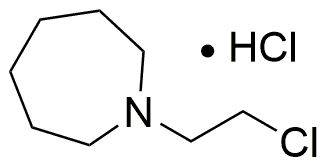1-(2-Chloroethyl)-1H-hexahydroazepine hydrochloride is widely utilized in research focused on:
- Pharmaceutical Development: This compound serves as an important intermediate in the synthesis of various pharmaceuticals, particularly in the development of medications targeting neurological disorders.
- Chemical Synthesis: It is employed in organic synthesis as a building block for creating more complex chemical structures, facilitating the production of novel compounds in medicinal chemistry.
- Research on Anticancer Agents: Researchers are investigating its potential as a precursor for anticancer drugs, leveraging its unique chemical properties to enhance efficacy against specific cancer types.
- Material Science: The compound is explored in the development of new materials, particularly polymers, where its chemical reactivity can lead to innovative applications in coatings and adhesives.
- Biochemical Studies: It is used in studies investigating the mechanisms of action of certain biological pathways, providing insights that can lead to the discovery of new therapeutic targets.
Informations générales
Propriétés
Sécurité et réglementation
Applications
1-(2-Chloroethyl)-1H-hexahydroazepine hydrochloride is widely utilized in research focused on:
- Pharmaceutical Development: This compound serves as an important intermediate in the synthesis of various pharmaceuticals, particularly in the development of medications targeting neurological disorders.
- Chemical Synthesis: It is employed in organic synthesis as a building block for creating more complex chemical structures, facilitating the production of novel compounds in medicinal chemistry.
- Research on Anticancer Agents: Researchers are investigating its potential as a precursor for anticancer drugs, leveraging its unique chemical properties to enhance efficacy against specific cancer types.
- Material Science: The compound is explored in the development of new materials, particularly polymers, where its chemical reactivity can lead to innovative applications in coatings and adhesives.
- Biochemical Studies: It is used in studies investigating the mechanisms of action of certain biological pathways, providing insights that can lead to the discovery of new therapeutic targets.
Documents
Fiches de données de sécurité (FDS)
La FDS fournit des informations de sécurité complètes sur la manipulation, le stockage et l’élimination du produit.
Spécifications du produit (PS)
Le PS fournit une description complète des propriétés du produit, notamment sa composition chimique, son état physique, sa pureté et les exigences de stockage. Il détaille également les plages de qualité acceptables et les applications prévues du produit.
Certificats d'analyse (COA)
Recherchez des certificats d'analyse (COA) en saisissant le numéro de lot du produit. Les numéros de lot et de lot se trouvent sur l'étiquette d'un produit, après les mots « Lot » ou « Lot de fabrication ».
Numéro de catalogue
Numéro de lot/série
Certificats d'origine (COO)
Ce certificat d'exploitation confirme le pays dans lequel le produit a été fabriqué, et détaille également les matériaux et composants utilisés et s'il est issu de sources naturelles, synthétiques ou autres sources spécifiques. Ce certificat peut être requis pour les douanes, le commerce et la conformité réglementaire.
Numéro de catalogue
Numéro de lot/série
Fiches de données de sécurité (FDS)
La FDS fournit des informations de sécurité complètes sur la manipulation, le stockage et l’élimination du produit.
DownloadSpécifications du produit (PS)
Le PS fournit une description complète des propriétés du produit, notamment sa composition chimique, son état physique, sa pureté et les exigences de stockage. Il détaille également les plages de qualité acceptables et les applications prévues du produit.
DownloadCertificats d'analyse (COA)
Recherchez des certificats d'analyse (COA) en saisissant le numéro de lot du produit. Les numéros de lot et de lot se trouvent sur l'étiquette d'un produit, après les mots « Lot » ou « Lot de fabrication ».
Numéro de catalogue
Numéro de lot/série
Certificats d'origine (COO)
Ce certificat d'exploitation confirme le pays dans lequel le produit a été fabriqué, et détaille également les matériaux et composants utilisés et s'il est issu de sources naturelles, synthétiques ou autres sources spécifiques. Ce certificat peut être requis pour les douanes, le commerce et la conformité réglementaire.


